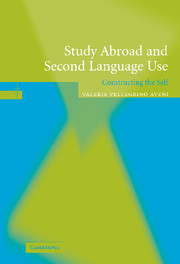Book contents
- Frontmatter
- Contents
- Acknowledgments
- Note on text conventions
- Abbreviations
- Introduction
- 1 Language use in a social context
- 2 The social dance: second language use and the construction of self
- 3 Learners and their environment: factors affecting self-construction
- 4 Coming into our own: the convergence of real self and ideal self
- Conclusion: The self in the second language: implications and next steps
- Appendix 1 Study context and research methodology
- Appendix 2 ACTR study-abroad program participants: 1995–1996 demographic profile
- Appendix 3 Participant profiles
- References
- Index
Appendix 3 - Participant profiles
Published online by Cambridge University Press: 06 January 2010
- Frontmatter
- Contents
- Acknowledgments
- Note on text conventions
- Abbreviations
- Introduction
- 1 Language use in a social context
- 2 The social dance: second language use and the construction of self
- 3 Learners and their environment: factors affecting self-construction
- 4 Coming into our own: the convergence of real self and ideal self
- Conclusion: The self in the second language: implications and next steps
- Appendix 1 Study context and research methodology
- Appendix 2 ACTR study-abroad program participants: 1995–1996 demographic profile
- Appendix 3 Participant profiles
- References
- Index
Summary
There were a total of seventeen participants in the present study: six who comprised the core data set (“primary cases”) and eleven whose data provided additional support and illustration in the study (the “supporting cast”). The following profiles provide in-depth information regarding each of the participants. They give a comprehensive backdrop for the learners' experiences presented throughout the work and will help the learner understand the personality and story behind those experiences.
Primary cases
“Bob”
Bob was a unique participant for a study-abroad program. The oldest learner of the seventy-six students (29 at the time of application), Bob had studied Russian for the least amount of time, fitting two years of Russian study into the nine months preceding. Bob had never studied any other foreign language. He was also married, and he and his wife were participating on the program together. While in Russia, they shared a homestay, were both part of the same study group in the same institute in Moscow, and spent virtually all of their free time together. Moreover, unlike most other students, Bob had a significant employment history behind him; he had already served in the military and as a police officer in a large metropolitan center and was hoping eventually to obtain a law degree and to establish a career in federal law enforcement. When Bob participated in this study-abroad program, he was completing his undergraduate degree in political science at a large state university and was preparing to apply to law school.
- Type
- Chapter
- Information
- Study Abroad and Second Language UseConstructing the Self, pp. 159 - 176Publisher: Cambridge University PressPrint publication year: 2005



